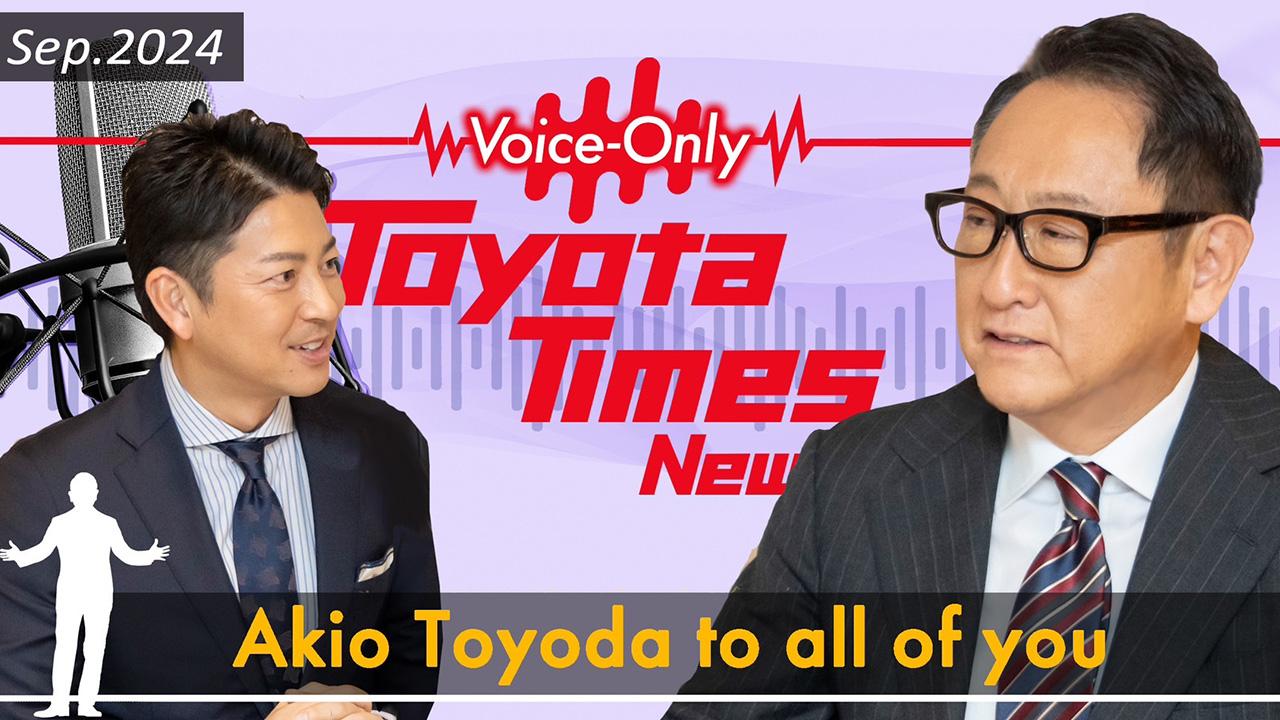
Toyota's Olympic and Paralympic sponsorship agreement will conclude at the end of 2024. Chairman Toyoda outlines the reasons for not renewing and the company's new support for its athletes.
Akio's commitment to 'People First'
Tomikawa
It was a very moving speech.
Toyoda
It’s nice to see it from this side (of the camera).
Tomikawa
Different from being up on stage?
Toyoda
On stage, I could only see the athletes.
Tomikawa
Aside from the athletes, the assembled dealers were also moved to tears…
Toyoda
I agonized over where, when, and how to convey our decision to end the partnership. It had been finalized before the Paralympics in Paris.
Tomikawa
The agreement was for ten years.
Toyoda
But I worried how breaking such news during the Olympic and Paralympic Games would affect the athletes.
Tomikawa
It would no doubt add anxiety.
Toyoda
But I didn’t think it was good to remain silent for long, either.
Originally, I hadn’t planned on attending the dealer meeting. I didn’t go last year either—that’s more of a president’s duty.
But I have always supported our athletes. Amy Purdy (American para-snowboarder, actress, and model) and others asked if I could speak in person, so despite all the difficulties, we managed to make it work, and I was able to go.
In the end, watching this now, I think I was able to send the right message to the right people at the right time.
Tomikawa
To sum it up, you explained that Toyota athletes worldwide will continue to receive support, including off-the-field assistance in developing equipment for para-athletes.
To say it was “emotional” doesn’t begin to describe the tearful mood.
Toyoda
I think there was an initial disappointment, and then the message that things would continue hit home.
You need to tell the facts as they are, but it really tormented me after we made the decision.
On top of that, the head of Toyota in America is Jack Hollis, a former major leaguer.
Having been a ballplayer himself, I’m sure his feelings overlap more closely with the athletes.
I received some messages of extreme disappointment, and I really agonized over what I could do. This was the result.
It’s not a matter of cost by any means.
I wanted to figure out the best way to ensure we were putting people first. After listening to the views and opinions of many different people, I feel that we ultimately managed to find a good way out.
Tomikawa
You explained the decision to sustain support, but given that Toyota will not continue its Olympic and Paralympic sponsorship agreement, could you provide specific details of what that will entail?
Toyoda
Olympic and Paralympic support comes under the sponsorship agreement. In terms of marketing, for example, we will no longer use the Olympic logo, and we will no longer provide vehicles for the Games.
However, our support for athletes goes beyond just the Olympic period—we help them every day of the four years in between.
That’s quite a difficult task. Being a best-in-town company, many people have athletes that they want to support.
Financial support is also essential for them to keep doing what they have been doing.
Of course, they have been providing hands-on support, but even that requires financial support. I began by explaining that such assistance would remain the same, and I think that reassured everyone more than anything.
Tomikawa
In your speech, you also mentioned a support scheme through the Toyota Mobility Foundation. This is something the TMF is already doing, isn’t it?
Toyoda
Paralympians, in particular, are superhuman. For them, competing is a collaborative effort between the individual and their equipment.
We are a monozukuri company. That means we can provide equipment support. We do what we can, but when something proves too difficult for Toyota to handle, the foundation offers a way to engage many different people.
Since I am also chairman at TMF, I made the proposal not as a substitute for Toyota but to ensure sustainability.
Our equipment development and other activities have also been done through the Mobility Foundation.
We have assisted people who make prosthetic legs and given medals to those who provide regular support at the Special Olympics. I think these are worthwhile efforts.
They will be an ongoing part of the Mobility Foundation’s activities. As a result, I think we can continue to provide support in a way that puts people and athletes first.
Tomikawa
And you will continue to play the guardian role?
Toyoda
That’s right.
Tomikawa
Akio, thank you for today.
Toyoda
Thank you.

